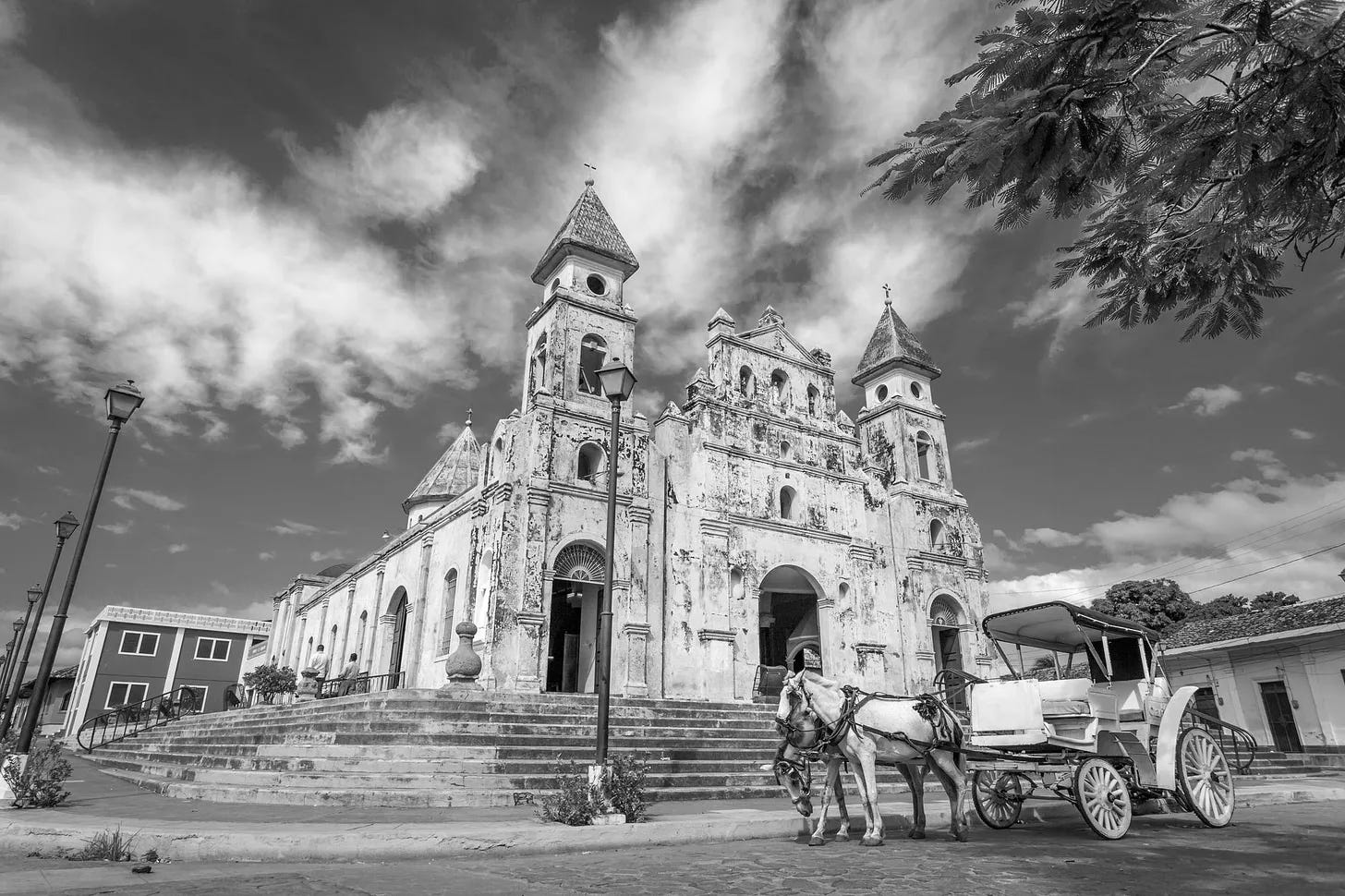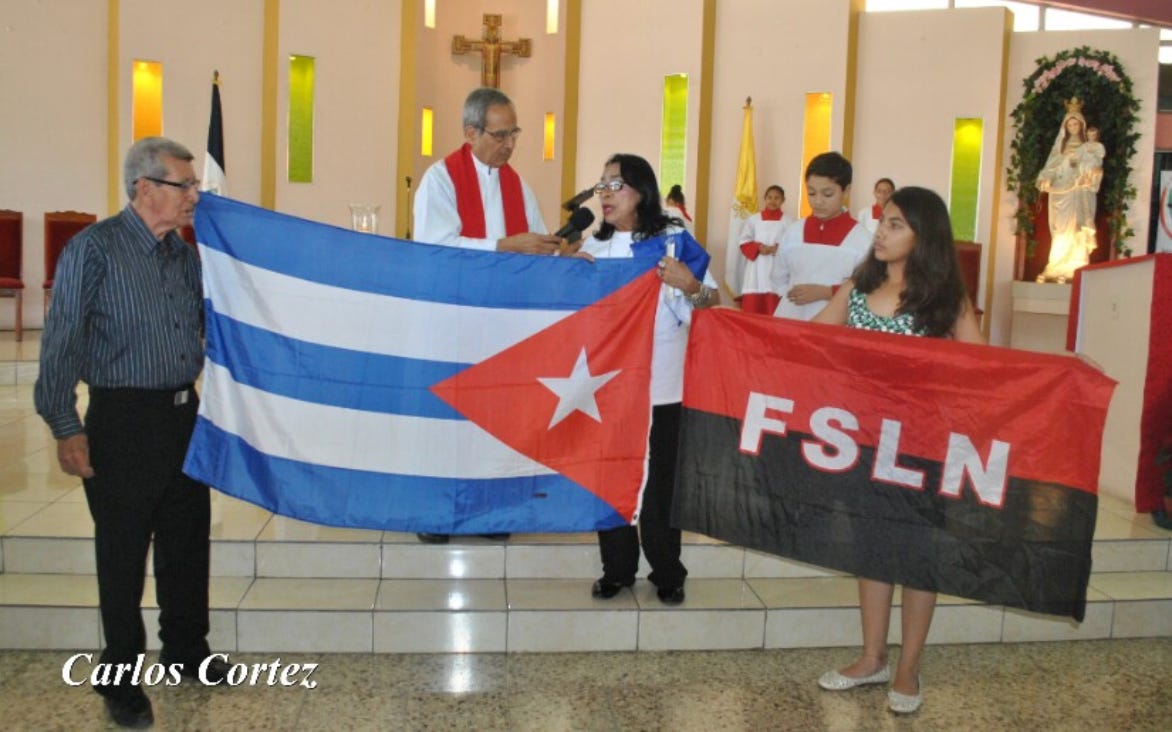
The priests of the Nicaraguan dictatorship
How has Ortega achieved the tacit - or even public - support of a handful of local priests?
Over the last six years, Daniel Ortega’s government has orchestrated a campaign of harassment, mass arrest, imprisonment, and exile of Nicaraguan clergy, and overseen the near wholesale confiscation of Church property and assets.
But, despite ushering in a new era of persecution against the local Catholic Church, the Nicaraguan dictatorship has successfully courted the support of at least some members of the clergy in the country.
While some of these priests are older priests who were involved in the Sandinista revolution in the 1970s that first took Daniel Ortega to power from 1979 to 1990, many were once staunch opponents of the regime, but seem to have had a change of heart — either now supporting it outright or staying silent about its human rights abuses and persecution of the Church.
So why is Ortega looking for support within the Nicaraguan clergy? And how has he achieved the tacit or even public support of a handful of local priests?
An episcopal strategy?
With the apostolic nuncio expelled, two diocesan bishops forced into exile, a vacant diocese, and two other bishops serving past retirement age, many local Catholics believe that Ortega is trying to push for the promotion of priests supportive of the regime to become bishops.
Pope Francis has so far resisted making a new episcopal appointment in Siuna, from which Bishop Isidoro Mora was exiled in January. Similarly, Matagalpa and Estelí, led by the exiled Rolando Álvarez as bishop and apostolic administrator, respectively, remain in a kind of leadership limbo.
The pope has also allowed Bishop Carlos Herrera of Jinotega and Cardinal Leopoldo Brenes of Managua to serve past retirement age.
Of course, Herrera, Brenes, Álvarez, and Mora are all younger than Ortega himself — who is already 78 years old. It is possible Pope Francis might be seeking to play the long game as Ortega’s health wanes, banking on a potential successor to have a more constructive relationship with the Church.
But if that is the case, it’s not clear how long the local Church can survive a “wait and see” approach. The latest wave of persecution has left the Diocese of Matagalpa, for example, with fewer than 20 priests, nearly 70% less than what it had in 2022.
Successive waves of clerical arrests and deportations could prove a powerful pressure on the Vatican to accept some friendly episcopal appointments to allow the persecution to stop, with Ortega offering Francis the tacit possibility of having a “free,” but silent and compliant Church.
So far, it seems unlikely that Francis would accept such a deal, and the Vatican has shown no signs of being open to even informal collaboration with Ortega. But the signs are that the dictator has already managed to steer some friendly priests into positions of power in their dioceses.
In the capital Archdiocese of Managua, led by Cardinal Brenes, the Ortega regime has successfully forced out almost the entire diocesan curia — the auxiliary bishop, vicar general, chancellor, treasurer, secretary general, pastoral vicar, and vicar for families have all been exiled, with most of the priests leaving in January this year.
One of the few exceptions to the purge of the chancery is Fr. Julio Arana, the judicial vicar, who recently baptized Ortega’s grandson.
Cardinal Brenes has, of necessity, moved to fill some of the vacant positions, but notably he has done so with priests who are close to the Ortega regime: the new vicar general of the archdiocese, Fr. José Ramón Alemán is known to be close Fr. Arana, and Fr. Rafael Ríos — a priest of the Diocese of Jinotega, who concelebrated the recent baptism of Ortega’s grandson.
Similarly, Fr. Boanerges Carballo, the new pastoral vicar, has family ties to the government — his late sister was the Nicaraguan ambassador to the Vatican when the government persecution against the Church erupted in 2018, amid countrywide protests.
Ambition and intimidation?
Despite having at least some visible connections to the regime, though, all three priests have a complicated history with the government.
Fr. Alemán was attacked by Sandinistas during the 2018 protests, along with many Nicaraguan bishops, and Fr. Carballo’s brother was exiled during Ortega’s first government in the 1980s.
During the 2018 protests, though, Carballo tried to mediate following the government’s attacks on the Church, saying that “they see us as a political adversary, but it’s a wrong perception they have in their hearts and minds” because of an “incomprehension of the humanitarian work [of the Church].”
By 2023, Carballo was one of only a handful of priests allowed to hold a religious procession in August, following the arrest of almost a dozen of priests by state authorities. Carballo said at the time that the procession was possible thanks to his “capacity of talking, praying, and working together” with the government, and he thanked Ortega and his wife and vice president, Rosario Murillo, for allowing the procession.
In addition to his post as pastoral vicar, Carballo was also appointed in 2024 as the pastor of the Santo Cristo de Esquipulas parish. The previous pastor, Fr. Héctor Treminio, was also the treasurer of the diocese and was exiled by the regime in January.
Fr. Julio Arana also had an unexpected change of heart.
In 2018, he was one of the staunchest public defenders of the auxiliary bishop of Managua, Bishop Silvio Báez, who became the leading voice of the Church’s opposition to the Nicaraguan dictatorship, saying that those who defamed and persecuted Báez had “hatred in their hearts” and criticized the basic ecclesial communities — Catholic lay groups inspired by liberation theology, that strongly supported the Sandinista revolution — for “taking the party line.”
Fast forward to this summer, and Arana baptized Ortega’s grandson in early June and in August was reportedly put in charge of taking a group of priests under house arrest in a Managua seminary to the airport for exile to Rome.
Arana was also assigned as pastor of the Purísima Concepción parish in Managua in late July. The previous pastor, Fr. Gerardo Rodríguez, was also exiled in January.
But what prompted these apparent changes of heart? Many Nicaraguan Catholics, laity and clerics, believe there are three reasons: Threats, ambition, and skeletons in the closet.
“Some of these priests are just receiving threats so they do what the regime tells them to do. It’s the case of Cardinal Brenes, who doesn’t support the regime but stays silent and tries to appease it because he’s under constant surveillance and police investigation” one exiled priest told The Pillar.
“The ideological support [for Ortega] within the clergy is almost zero,” another senior exile told The Pillar. “Most of the priests influenced by liberation theology that supported the revolution in the 1980s are now against Ortega. So, the main motive here is ambition.”
“These are priests that are trying to show the regime that if they help them move up on the ladder, they will be more diplomatic, they won’t denounce the human rights abuses,” he said.
However, some believe that many of these priests could be being coerced or even blackmailed into cooperating with the authorities.
“The dictatorship has a huge intelligence apparatus. With many priests, their modus operandi is to investigate them and see if they have something going on, whether it’s money problems, sexual misconduct, or even pedophilia. If they find something, they use it to get the priest’s public support. If they don’t find anything, they proceed with threats,” the exiled Catholic added.
“If threats don’t work, as it was in my case, they proceed with public defamation. Ortega’s supporters started saying first that I was a homosexual, and then that I trafficked kids so the bishops could rape them. If that doesn’t work, then it’s jail or exile,” he said.
Several exiled priests pointed The Pillar to the case of Bishop René Sándigo of León as a possible example of state coercion.
Sándigo was a staunch opponent of Ortega, until local media reported that the bishop had a computer stolen from his office in 2019.
Since that theft, Sándigo has become increasingly close to the Ortega regime. He is perhaps the only bishop who has not received public threats since 2019, and one of the few who has been allowed to continue with processions during Holy Week and around the feast of the Immaculate Conception, the national patronal feast.
In turn, Sándigo has publicly and privately shown himself to be close to the Nicaraguan dictatorship, attending official events and allowing himself to be photographed with Ortega and other leaders.
In addition, local sources told The Pillar that Sándigo has threatened to block priests exiled from his diocese from being incardinated in a diocese abroad if they decide to speak publicly about the situation in Nicaragua.
Among Nicaraguan clergy, Sándigo is widely held to be Ortega’s favorite candidate to succeed Cardinal Brenes in Managua.
Old friends
Other priests, though, seem to support the regime for ideological reasons, such as Fr. Antonio Castro, who has been close to Ortega since the years of the revolution.
Castro is well-known for constantly talking about Ortega, Fidel Castro and Hugo Chávez in his homilies and even displaying the Sandinista party flag and the Cuban flag during Mass. On the first anniversary of Fidel Castro’s death, Fr. Castro celebrated a Mass in his memory wearing red liturgical vestments, reserved for the feast days of martyrs.
Notably, Castro’s parish received government subsidies for over $161k between 2007 and 2018, which is almost the same amount the Cathedral of León, a UNESCO World Heritage Site, received over the same period.
Earlier this year, Castro was appointed pastor of the Santa Faz parish. The previous pastor, Silvio Fonseca, was exiled by the Ortega regime in January.
Another priest who has been long seen as supportive of the Ortega regime is Fr. Rafael Ríos, who concelebrated the baptism of Ortega’s grandson earlier this summer.
According to local media, Ríos was removed from his parish in the Diocese of Jinotega in 2010 for supporting Ortega’s candidacy for the 2011 presidential election from the pulpit, despite being told by his bishop not to do so.
Ríos refused to leave the parish and was supported by members of pro-government paramilitary groups, who seized the parish to try to force the bishop to reverse his decision, though Ríos had to eventually move to a different parish.
Ríos was also allegedly supportive of the exile of another local priest, Fr. Juan Carlos Treminio, OFM, who was not allowed to return to Nicaragua after a trip to Guatemala in 2022.
Although the majority of Nicaraguan clergy continue opposing Ortega’s regime, the Nicaraguan dictatorship has ecclesiastical supporters in high places. It’s the local episcopacy, and the pope’s decision, whether they can continue to climb.












Edgar thanks so much for this insightful reporting and analysis. My parishioners exiled from Nicaragua have very few who share what’s happening there. Praying for the country.
During the Turkish invasion of Otranto, Italy, in 1480, after the Turks had successfully breached the walls and taken over the town, killed the Archbishop, duke and another bishop, and rounded up the 800+ surviving men and boys (who would soon all be beheaded), there was a priest who had submitted to the Islamists and who was telling the men of the town that it was OK for them to do the same and that, if they did, they would be given gifts and their wives and children would be free to live, etc… So it’s no surprise that there are priests who are acting as Ortega’s lapdogs.